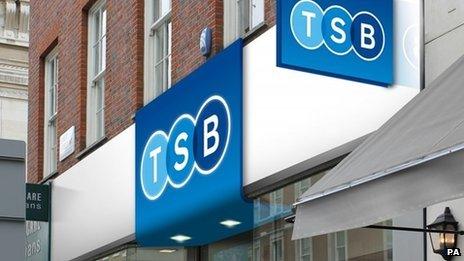Lloyds Bank's Horta-Osorio defends £1.7m bonus to BBC
- Published
Lloyds Bank is "back to normal" says boss Antonio Horta-Osorio and its progress makes his bonus "appropriate"
Lloyds Bank chief executive Antonio Horta-Osorio says in an exclusive interview with the BBC that his bonus, worth £1.7m, is aligned with taxpayers' interests.
The UK bank is 33% owned by the UK government.
The bank has increased its overall pool of bonuses for all staff to £395m, up from £365m the previous year.
Lloyds Bank also reported a pre-tax profit, external, of £415m, for the first time since its £20.5bn bailout.
Lloyds made a loss of of £606m in 2012.
In all, 78% of the bonus pool is in the form of shares. Mr Horta-Osorio's shares cannot be cashed in until 2019.
Mr Horta-Osorio told the BBC: "I strongly believe you should link compensation with performance, and having increased our underlying profits by 140%, we thought it was appropriate to increase the bonus pool of the bank by 8%.
"I have also agreed to have additional conditions to my bonus... which is fully paid in shares, which aligns my interests with the interests of the taxpayer, so if the strategy we are pursuing proves itself wrong, that money can be clawed back."
The Unite union said Lloyds had given staff at branches and call centres a 2% pay rise this year and cut more than 35,000 jobs since its bailout.
Unite national officer Rob Macgregor said: "The chief executive's £1.7m bonus, on top of shares worth millions awarded at the end of October, is a kick in the teeth to the taxpayer, and to hard-working staff who don't know if they will be next in line for the chop."
Alastair Blair, head of consultancy group Accenture's UK and Ireland banking practice, disagreed: "Clearly the shareholders are more comfortable with this - the government approved it. And secondly, this bonus won't be paid for another five years, so there's a lot of water to pass under the bridge."
Compensation
Underlying profits in 2013 for the banking group rose 140% from £2.6bn to £6.2bn.
The bank put aside another £1.8bn in the fourth quarter of the year to cover compensation to customers for the past mis-selling of payment protection insurance (PPI) plans.
That brings the total provision made last year for PPI compensation to £3.5bn. Since new rules were introduced in 2011 to tighten up the selling of PPI, Lloyds has put aside a total of £9.8bn - more than any other bank - to cover compensation claims or "legacy" issues.
Mr Horta-Osorio said: "The legacy issues were much higher than we had anticipated or than the regulator thought then, and we were absolutely committed to cleaning them and doing the right thing for customers... It is not a matter of financials, it is a matter of principle."
Dividends
The bank said it expected to apply to the Prudential Regulatory Authority in the second half of this year to restart dividend payments "at a modest level". Investors have not had a dividend from Lloyds shares since 2008.
UK Financial Investments, which manages the government's 33% stake, sold a 6% shareholding in the bank last September.
The Chancellor of the Exchequer, George Osborne, has said he wants to sell more shares in the bank to the public before the election in 2015.
Mr Horta-Osorio said: "We have continued to improve the bank and the price [of Lloyd's shares] is substantially above the price at which the first tranche was sold in September - 75p - and the bank is ready to sell another tranche, but it is absolutely up to the UK Treasury to decide when and how to do it."
Alex Potter, equity research analyst at Mirabaud Securities, said the latest numbers suggested "a decent dividend payout".
He said: "The management is clearly dropping the hint that it'll move fairly sharply to a big payout ratio, which could imply a £3bn annual payout, which would give a yield near 5% in 2015-16."

TSB was separated from Lloyds last September
TSB moves
Lloyds rebranded and separated its other retail banking business, TSB, last September.
It is negotiating with the European Commission over issues of state aid before selling it in a public share offering this year, and admitted the cost of the separation and rebranding was some £1.6bn.
Lloyds Bank Group is registered in Scotland and owns the Bank of Scotland brand. Mr Horta-Osorio said that the vote on Scottish independence was strictly a matter for Scottish people.
"That decision goes far beyond economics," said Mr Horta-Osorio.
"If the final vote is a 'Yes' vote, given that there will 18 months before a separation takes place, we believe we have more than enough time to assess the consequences."
- Published27 January 2014
- Published3 February 2014
- Published3 February 2014